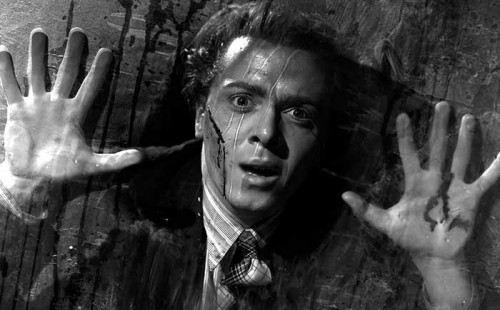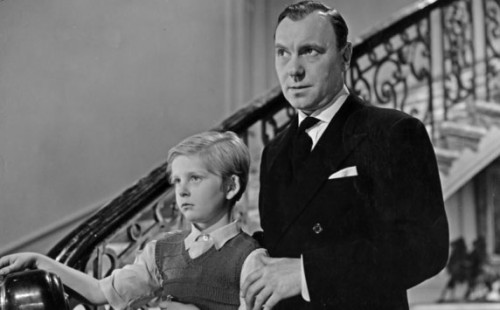GRAHAM GREENE’S WENT THE DAY WELL?
6:30 ONLY
Tuesday, May 31
Directed by Alberto Cavalcanti
(1942, Alberto Cavalcanti) Ah, there’ll-always-be-an-England: the chatty, gossipy postmistress; the graciously condescending lady of the manor; the timid spinster exchanging tentative doe eyes with the courteous squire; the wily poacher brazening it out with the suspicious constable; the hovering, white-maned vicar; the obstreperously nosey Cockney evacuee. But what’s that para on maneuvers doing with that sweet labeled Chokolade—Wien in his kit? And why do the soldiers cross their 7s in “the Continental manner?” What could have been cozy British comedy — from the same Ealing Studios that later patented the brand, with films like Passport to Pimlico and The Lavender Hill Mob — suddenly turns into The Eagle Has Landed meets Straw Dogs, as a beloved village character takes an axe to a Nazi and a well-bred lady grimly pumps lead into the local Quisling. Unsung, rip-roaring propaganda for Vigilance, made when the Axis was seemingly invincible and Fifth Columnists and invasion were actually still ominous possibilities; its framing story is astonishingly set in a victorious post-war Britain. Adapted from a Graham Greene story published in the American Collier’s magazine and directed by Brazilian native Cavalcanti, his first feature after two decades in both the French avant garde and British documentary movements, its cast is a succession of British film stalwarts: Leslie Banks, Elizabeth Allan, Basil Sydney, Mervyn Johns, David Farrar, Frank Lawton, Valerie Taylor, Thora Hird, et al. 35mm. Approx. 92 mins.
Reviews
“Establishes, with loving care and the occasional wry wink, the ultimate bucolic English scene, then takes an almost sadistic delight in tearing it to bloody shreds in an orgy of shockingly blunt, matter-of-fact violence.”
– Tom Huddleston, Time Out (London)
“What distinguishes [it] is Cavalcanti’s cool, brutal depiction of suddenly erupting violence and death; not only are British ‘heroes’ often dispatched with shocking realism, but quiet, cozy housewives find themselves killing the enemy with almost hysterical relish.”
– Geoff Andrew
“Its influence shows up in Village of the Damned and maybe even, with a twist, in Tarantino’s Inglorious Basterds.”
– Peter Bradshaw, The Guardian
“Violence gains the upper hand in the second half of the movie, with a harshness that has no equivalent in British cinema of the period. Shots are fired in the back, the Germans who lob grenades at women and children are skewered on bayonets and finished off with blows of a gun butt. Cavalcanti never refuses to delve into the consequences of violence…He never hides the price that must be paid.”
– Bertrand Tavernier
“The best, most ferocious picture of the war years…The work of a true auteur.”
– Philip French, The Observer
“JAWDROPPINGLY SUBVERSIVE!”
– Time Out (London)


